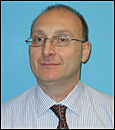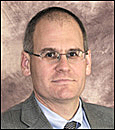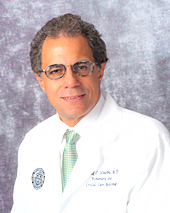Thanks to a new federal grant from the National Heart, Lung, and Blood Institute (NHLBI), part of the National Institutes of Health (NIH), investigators at The University of Pittsburgh Graduate School of Public Health and School of Medicine will lead a $16.8 million, five-year federal initiative to manage national clinical trials to further the objective of developing new treatments for breathing disorders.
The Network Management Core (NEMO) will coordinate and support trials related to the Pulmonary Trials Cooperative (PTC), which will carry out multiple clinical studies on a variety of chronic lung conditions, including interstitial lung disease, chronic obstructive pulmonary disease (COPD), pulmonary hypertension, sarcoidosis and obstructive sleep apnea.
 “The PTC program brings together expertise in lung disease research and treatment across the nation in one single, dynamic enterprise,” says Tony Punturieri, M.D., Ph.D., program officer in the Division of Lung Diseases at NHLBI. This novel structure should facilitate efforts to get tested clinical care to patients in dire need of new treatments across a broad spectrum of lung diseases. The PTC has letters of support from over 100 clinical research programs nationwide with registries totalling 72,000 people.
“The PTC program brings together expertise in lung disease research and treatment across the nation in one single, dynamic enterprise,” says Tony Punturieri, M.D., Ph.D., program officer in the Division of Lung Diseases at NHLBI. This novel structure should facilitate efforts to get tested clinical care to patients in dire need of new treatments across a broad spectrum of lung diseases. The PTC has letters of support from over 100 clinical research programs nationwide with registries totalling 72,000 people.
Chronic lung diseases are among the most common medical conditions in the world, with estimates of up 30 million people in the U.S. suffering from chronic obstructive pulmonary disease (COPD) alone, a condition that according to the Centers for Disease Control and Prevention is the third leading cause of death in America (138,080) after heart disease (597,689) and cancers (574,743). The American Lung Association notes that COPD is also a major cause of disability, and while some 12 millions Americans have a formal COPD diagnosis, an estimated 12 million more people may have the disease and go undiagnosed.
 The NEMO will be led by Stephen Wisniewski, Ph.D., epidemiology professor in Pitt Public Health, and Frank Sciurba, M.D., an Associate Professor of Medicine and Director of the Emphysema Research Center at UPMC Montefiore Hospital in Pittsburgh, and of Pitt’s Emphysema COPD Research Center in the Division of Pulmonary, Allergy and Critical Care Medicine.
The NEMO will be led by Stephen Wisniewski, Ph.D., epidemiology professor in Pitt Public Health, and Frank Sciurba, M.D., an Associate Professor of Medicine and Director of the Emphysema Research Center at UPMC Montefiore Hospital in Pittsburgh, and of Pitt’s Emphysema COPD Research Center in the Division of Pulmonary, Allergy and Critical Care Medicine.
“Across the country, multiple clinical trials will be in operation to address the urgent need for new treatments and to test existing treatments for people with chronic lung conditions, all managed under one program,” says Dr. Wisniewski, who is also Pitt’s associate vice provost for planning. “This will create a massive amount of data and requires diligent coordination and collaboration among trial sites, which we at Pitt have extensive experience facilitating.”
“Investigators in our pulmonary division have offered leadership in many clinical trials over the years and have successfully translated the latest scientific findings into improved patient care,” says Dr. Sciurba, also an associate professor in Pitt’s School of Medicine. “This expertise will be a great asset as we recruit and organize several dozen medical centers to work together to test new treatments for pulmonary patients.”
 Dr. Sciurba’s clinical focus is on advanced or difficult to manage patients with chronic obstructive pulmonary disease (COPD) including emphysema, and he and his team of colleagues at the University of Pittsburgh have extensive experience in evaluating patients for lung volume reduction surgery. In addition, he focuses on consideration of patients for enrollment in bronchoscopic volume reduction or other novel, pharmacologic, or biologic clinical trials considered for patients whose options are limited. Dr. Sciurba’s clinical and research philosophy revolves around the fact that all patients have a unique manifestation of COPD and thus may require a unique therapeutic regimen, specific to their own situation.
Dr. Sciurba’s clinical focus is on advanced or difficult to manage patients with chronic obstructive pulmonary disease (COPD) including emphysema, and he and his team of colleagues at the University of Pittsburgh have extensive experience in evaluating patients for lung volume reduction surgery. In addition, he focuses on consideration of patients for enrollment in bronchoscopic volume reduction or other novel, pharmacologic, or biologic clinical trials considered for patients whose options are limited. Dr. Sciurba’s clinical and research philosophy revolves around the fact that all patients have a unique manifestation of COPD and thus may require a unique therapeutic regimen, specific to their own situation.
Through the NEMO, Pitt will recruit and manage the clinical centers that will carry out specific trials awarded separately by NHLBI with cooperative agreement grant mechanisms. To improve efficiency and expedite the trials, the NEMO will also develop and distribute study-specific manuals, train staff at the clinical centers, manage a bank of biospecimens, provide a secure Web portal for communication among researchers and coordinate meetings, among many other responsibilities.
Additional NEMO investigators include Maria Mori Brooks, Ph.D., Scott O’Neil, M.A., Heather Eng, Christina Ledezma, Ph.D., Kevin Gibson, M.D., Kathleen Lindell, Ph.D., R.N., Patrick Strollo, M.D., Daniel Buysse, M.D., Mark Gladwin, M.D., Michael Mathier, M.D., Alison Morris, M.D., M.S., Joseph Pilewski, M.D., Yingze Zhang, Ph.D., Joseph Leader, Ph.D., and Michael Becich, M.D., Ph.D., all of Pitt; Stephen Rennard, M.D., of the University of Nebraska Medical Center; Charlton Strange, M.D., of the Medical University of South Carolina; Naftali Kaminski, M.D., of Yale School of Medicine; and Rebecca Bascom, M.D., M.P.H., of Penn State Milton S. Hershey Medical Center.
Sources:
University of Pittsburgh
National Heart, Lung, and Blood Institute (NHLBI)
National Institutes of Health (NIH)
The Network Management Core (NEMO)
Pulmonary Trials Cooperative(PTC)
Centers for Disease Control and Prevention
American Lung Association

